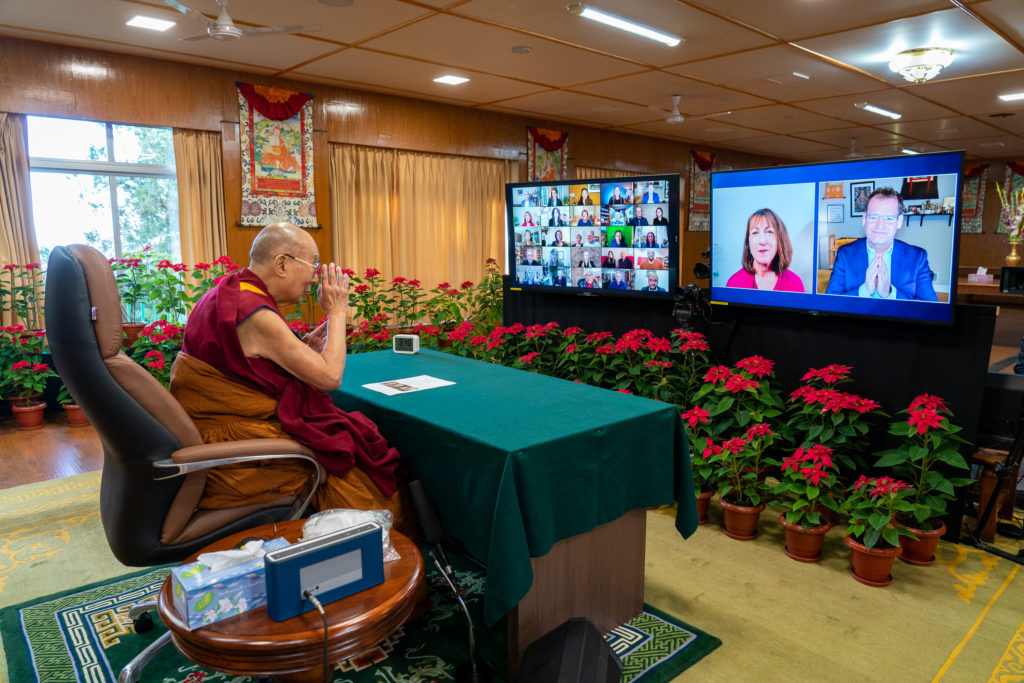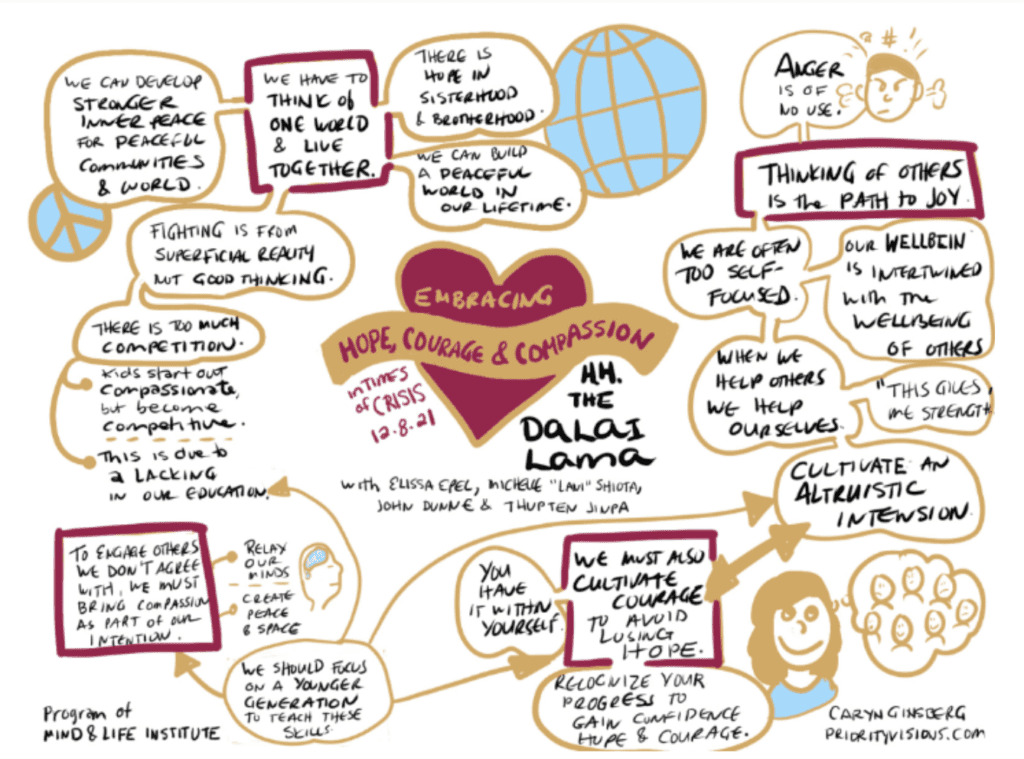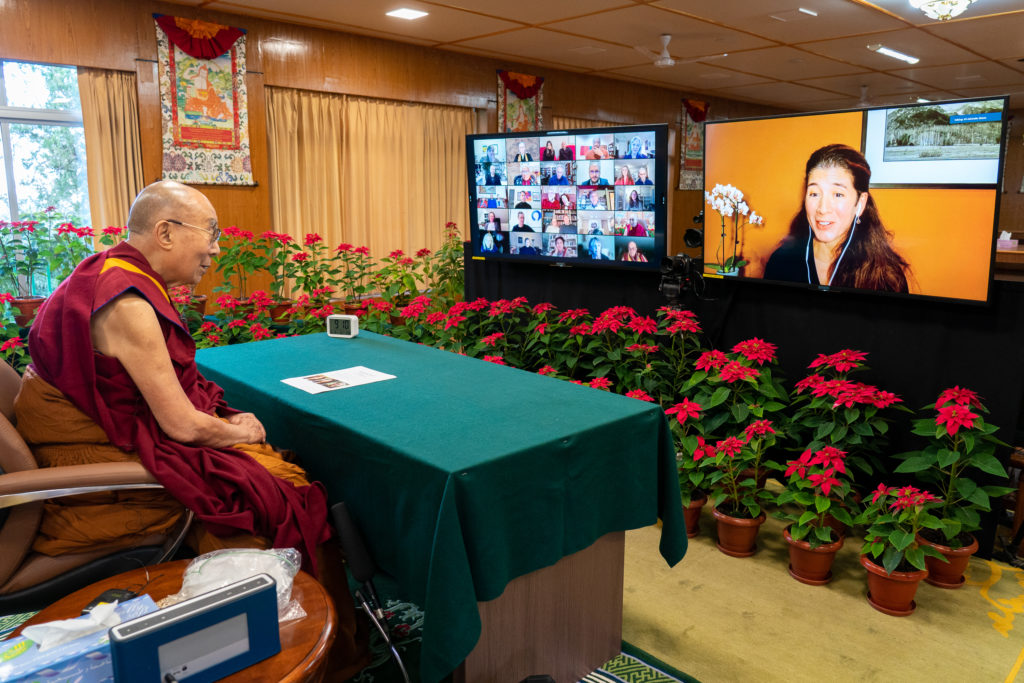
Photo credit Ven Tenzin Jamphel.
Data on the state of mental health in the world today paints a stark reality. According to a recent survey, 75% of young people globally feel the future is frightening in the face of climate change, and as a result of the Covid pandemic, an estimated 129 million more people have experienced anxiety and depression than before.
How can individuals build resilience and greater agency in the face of growing challenges and uncertainty? Science and contemplative wisdom offer valuable insights into how to better navigate current crises and be a force for good.
“The trouble maker is our own mind,” said His Holiness the Dalai Lama at a recent Mind & Life online event, Embracing Hope, Courage, and Compassion in Times of Crisis. “When the mind thinks in the right way, even in difficult circumstances, you can keep peace of mind.”
More than 365,000 viewers from around the globe tuned in to the livestream conversation on December 8 between the Dalai Lama, emotions researcher Michelle (Lani) Shiota, and stress scientist Elissa Epel. Hosted by Mind & Life president Susan Bauer-Wu, the event was moderated by Buddhist scholar John Dunne, with translation provided by Mind & Life board chair Thupten Jinpa, the Dalai Lama’s long-time English translator.
The hour-plus conversation interwove findings from the science of well-being with Buddhist wisdom. Together, speakers illuminated steps to better cope with today’s challenges—and their implications for the future. While we encourage you to watch the dialogue in its entirety, below are six lessons offered by our speakers.
1) Accept the reality of change and uncertainty. Elissa Epel spoke to the toll that constant stress and uncertainty about the future, particularly during the pandemic, can have on people, contributing to feelings of being unsafe and/or threatened. “Things are always changing; the future is unpredictable,” said the Dalai Lama, who shared his own experience in adapting to changing circumstances as a refugee living in India. Accepting that change is unavoidable can help anchor people in the reality of the present moment.

2) Cultivate peace of mind. The Dalai Lama spoke to the importance of being intentional in nurturing one’s peace of mind. At a young age, children are taught through the educational system to develop their intelligence and engage in competition, he said. Largely missing in education today is training on how to cultivate inner peace. His Holiness, a long-time advocate of ‘educating the heart,’ shared practices and teachings he uses to nurture peace of mind and a profound appreciation of our shared humanity. Lani Shiota pointed out how divided people have become in today’s world with different beliefs about issues like the pandemic and climate change. When people disagree, they often resort to anger, she said, which tends to push them into more extreme beliefs. The Dalai Lama underscored the importance of relaxing one’s mind, so that people can see situations more clearly and use their intelligence to make sound decisions rooted in compassion.
3) Strive to shift one’s focus from self to others. Cultivating a more altruistic outlook is “the gateway to greater joy,” said the Dalai Lama. “If one is seriously concerned about one’s well-being, one has to really open up one’s heart and create space for others.” Emotions like fear, stress, and suspicion can be exacerbated by excessive self-focus, he pointed out, adding that orienting toward others can help individuals achieve a more relaxed state. “If we help others, we help ourselves,” he said.
“If one is seriously concerned about one’s well-being,
one has to really open up one’s heart and create space for others.”
– His Holiness the Dalai Lama
4) Be aware of the tendency to fixate on problems; cultivate joy through positive experiences. Our minds tend to lock on to situations that feel threatening. “If we’re too oriented [toward] problems, we see problems everywhere,” said the Dalai Lama. It’s important to nurture a long-view of what’s possible—a hopeful outlook—and to develop the courage and confidence that goals can be achieved. Similarly, in troubling times, an intentional focus on finding joy in everyday life can help lower stress levels, said Lani Shiota. Looking for meaning and purpose in difficult circumstances, or positive reappraisal, can help individuals reframe and focus on the lessons embedded in challenging experiences.
5) Strengthen your awareness of our fundamental interconnection. In the past, there has been too much emphasis on “my community, my nation,” said the Dalai Lama. “Today, according to reality, we have to think about the world, about humanity.” Pointing to the prevalence of competition and conflict in today’s world, he spoke to the need for new priorities, emphasizing warmheartedness over weapons. Anger brings with it fear, he shared, and fear brings violence. More attention should be placed on nurturing inner peace—“not only through faith but through reason.” Suffering in the world offers humans the opportunity to become more mature and to consider how “our own well-being is intertwined with the well-being of others” and the planet, he said.

Photo credit Ven Tenzin Jamphel.
6.) Take action rooted in hope, compassion, and courage. “Crises open the door to larger societal change,” said Elissa Epel, who acknowledged the responsibility and privilege of being alive when there is so much at stake. “We know that small numbers of people can lead change and create a ‘social tipping point,’” she added. His Holiness stressed the importance of holding a hopeful vision for what is possible, and the need to meet the present moment with courage and the confidence needed to bring about change. One way to start thinking about one’s individual role in contributing to change, added Elissa, is through participating in the BIG JOY challenge, a citizen science project aimed at cultivating joy through micro-actions.
“The challenges we face are also opportunities,” said John Dunne in bringing the conversation to a close. The recognition of “our own capacity is something that I hope will fill us with hope and give us the confidence that leads to the long view [needed]… to overcome these challenges,” he said. The Dalai Lama went on to underscore Mind & Life’s valuable role in generating dialogue and inquiry aimed at better understanding the mind. “We used to only look outward, but now many people are concerned with how to achieve peace of mind,” he said. “I really appreciate that Mind & Life has created this new awareness,” he added, thanking all those who have contributed to its work.
To learn more, watch “Embracing Hope, Courage, and Compassion in Times of Crisis” (1:18) on our website.

